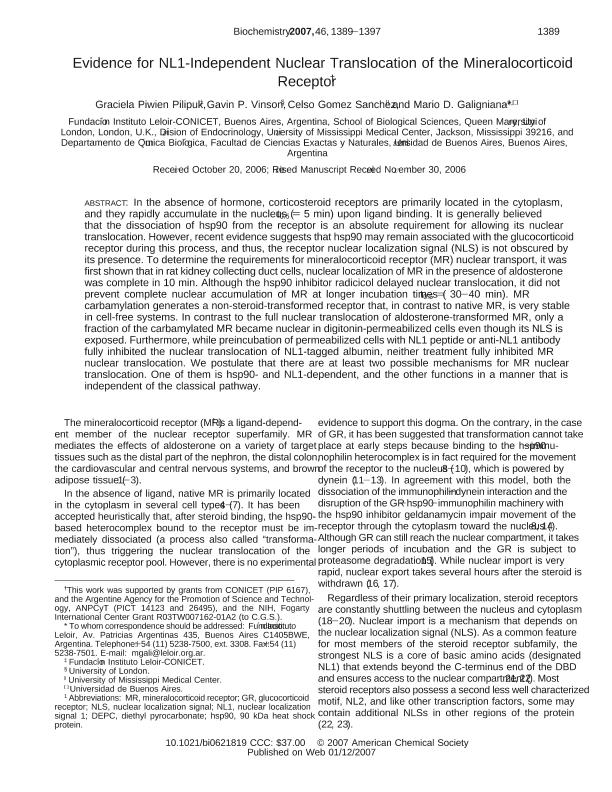Artículo
Evidence for NL1-independent nuclear translocation of the mineralocorticoid receptor
Fecha de publicación:
2007
Editorial:
American Chemical Society
Revista:
Biochemistry
ISSN:
0006-2960
e-ISSN:
1520-4995
Idioma:
Inglés
Tipo de recurso:
Artículo publicado
Clasificación temática:
Resumen
In the absence of hormone, corticosteroid receptors are primarily located in the cytoplasm, and they rapidly accumulate in the nucleus (t0.5 = 5 min) upon ligand binding. It is generally believed that the dissociation of hsp90 from the receptor is an absolute requirement for allowing its nuclear translocation. However, recent evidence suggests that hsp90 may remain associated with the glucocorticoid receptor during this process, and thus, the receptor nuclear localization signal (NLS) is not obscured by its presence. To determine the requirements for mineralocorticoid receptor (MR) nuclear transport, it was first shown that in rat kidney collecting duct cells, nuclear localization of MR in the presence of aldosterone was complete in 10 min. Although the hsp90 inhibitor radicicol delayed nuclear translocation, it did not prevent complete nuclear accumulation of MR at longer incubation times (t0.5 = 30-40 min). MR carbamylation generates a non-steroid-transformed receptor that, in contrast to native MR, is very stable in cell-free systems. In contrast to the full nuclear translocation of aldosterone-transformed MR, only a fraction of the carbamylated MR became nuclear in digitonin-permeabilized cells even though its NLS is exposed. Furthermore, while preincubation of permeabilized cells with NL1 peptide or anti-NL1 antibody fully inhibited the nuclear translocation of NL1-tagged albumin, neither treatment fully inhibited MR nuclear translocation. We postulate that there are at least two possible mechanisms for MR nuclear translocation. One of them is hsp90- and NL1-dependent, and the other functions in a manner that is independent of the classical pathway.
Archivos asociados
Licencia
Identificadores
Colecciones
Articulos(IBYME)
Articulos de INST.DE BIOLOGIA Y MEDICINA EXPERIMENTAL (I)
Articulos de INST.DE BIOLOGIA Y MEDICINA EXPERIMENTAL (I)
Articulos(IIBBA)
Articulos de INST.DE INVEST.BIOQUIMICAS DE BS.AS(I)
Articulos de INST.DE INVEST.BIOQUIMICAS DE BS.AS(I)
Citación
Piwien Pilipuk, Graciela; Vinson, Gavin P.; Gomez Sanchez, Celso; Galigniana, Mario Daniel; Evidence for NL1-independent nuclear translocation of the mineralocorticoid receptor; American Chemical Society; Biochemistry; 46; 5; -1-2007; 1389-1397
Compartir
Altmétricas




